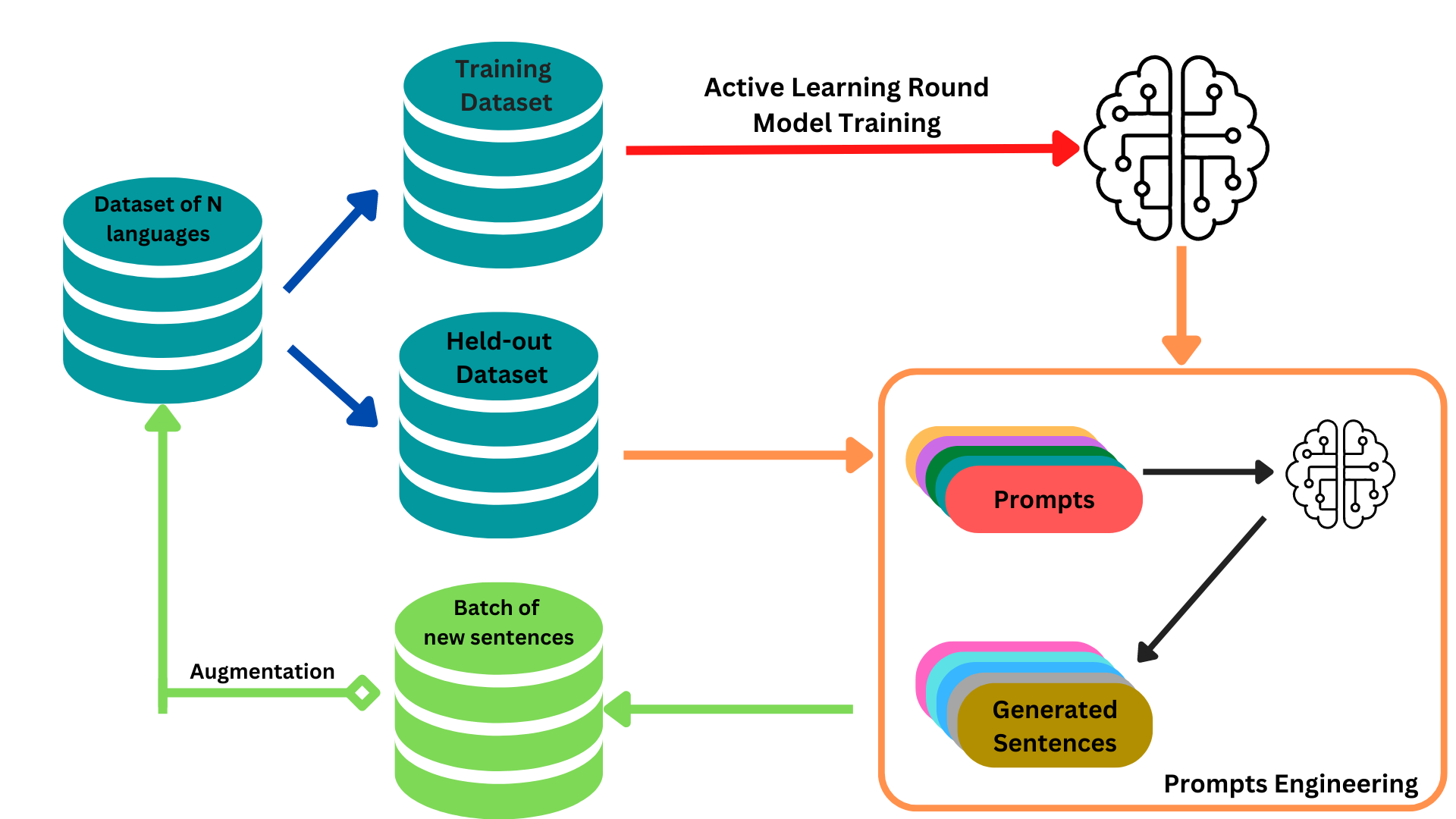Datasets:
annotations_creators:
- crowdsourced
language:
- amh
- orm
- lin
- hau
- ibo
- kin
- lug
- luo
- pcm
- swa
- wol
- yor
- bam
- bbj
- ewe
- fon
- mos
- nya
- sna
- tsn
- twi
- xho
- zul
language_creators:
- crowdsourced
license:
- cc-by-4.0
multilinguality:
- monolingual
pretty_name: afrolm-dataset
size_categories:
- 1M<n<10M
source_datasets:
- original
tags:
- afrolm
- active learning
- language modeling
- research papers
- natural language processing
- self-active learning
task_categories:
- fill-mask
task_ids:
- masked-language-modeling
AfroLM: A Self-Active Learning-based Multilingual Pretrained Language Model for 23 African Languages
This repository contains the dataset for our paper AfroLM: A Self-Active Learning-based Multilingual Pretrained Language Model for 23 African Languages which will appear at the third Simple and Efficient Natural Language Processing, at EMNLP 2022.
Our self-active learning framework
Languages Covered
AfroLM has been pretrained from scratch on 23 African Languages: Amharic, Afan Oromo, Bambara, Ghomalá, Éwé, Fon, Hausa, Ìgbò, Kinyarwanda, Lingala, Luganda, Luo, Mooré, Chewa, Naija, Shona, Swahili, Setswana, Twi, Wolof, Xhosa, Yorùbá, and Zulu.
Evaluation Results
AfroLM was evaluated on MasakhaNER1.0 (10 African Languages) and MasakhaNER2.0 (21 African Languages) datasets; on text classification and sentiment analysis. AfroLM outperformed AfriBERTa, mBERT, and XLMR-base, and was very competitive with AfroXLMR. AfroLM is also very data efficient because it was pretrained on a dataset 14x+ smaller than its competitors' datasets. Below the average F1-score performances of various models, across various datasets. Please consult our paper for more language-level performance.
| Model | MasakhaNER | MasakhaNER2.0* | Text Classification (Yoruba/Hausa) | Sentiment Analysis (YOSM) | OOD Sentiment Analysis (Twitter -> YOSM) |
|---|---|---|---|---|---|
AfroLM-Large |
80.13 | 83.26 | 82.90/91.00 | 85.40 | 68.70 |
AfriBERTa |
79.10 | 81.31 | 83.22/90.86 | 82.70 | 65.90 |
mBERT |
71.55 | 80.68 | --- | --- | --- |
XLMR-base |
79.16 | 83.09 | --- | --- | --- |
AfroXLMR-base |
81.90 |
84.55 |
--- | --- | --- |
- (*) The evaluation was made on the 11 additional languages of the dataset.
- Bold numbers represent the performance of the model with the smallest pretrained data.
Pretrained Models and Dataset
Models:: AfroLM-Large and Dataset: AfroLM Dataset
HuggingFace usage of AfroLM-large
from transformers import XLMRobertaModel, XLMRobertaTokenizer
model = XLMRobertaModel.from_pretrained("bonadossou/afrolm_active_learning")
tokenizer = XLMRobertaTokenizer.from_pretrained("bonadossou/afrolm_active_learning")
tokenizer.model_max_length = 256
Autotokenizer class does not successfully load our tokenizer. So we recommend using directly the XLMRobertaTokenizer class. Depending on your task, you will load the according mode of the model. Read the XLMRoberta Documentation
Reproducing our result: Training and Evaluation
- To train the network, run
python active_learning.py. You can also wrap it around abashscript. - For the evaluation:
- NER Classification:
bash ner_experiments.sh - Text Classification & Sentiment Analysis:
bash text_classification_all.sh
- NER Classification:
Citation
@inproceedings{dossou-etal-2022-afrolm, title = "{A}fro{LM}: A Self-Active Learning-based Multilingual Pretrained Language Model for 23 {A}frican Languages", author = "Dossou, Bonaventure F. P. and Tonja, Atnafu Lambebo and Yousuf, Oreen and Osei, Salomey and Oppong, Abigail and Shode, Iyanuoluwa and Awoyomi, Oluwabusayo Olufunke and Emezue, Chris", booktitle = "Proceedings of The Third Workshop on Simple and Efficient Natural Language Processing (SustaiNLP)", month = dec, year = "2022", address = "Abu Dhabi, United Arab Emirates (Hybrid)", publisher = "Association for Computational Linguistics", url = "https://aclanthology.org/2022.sustainlp-1.11", pages = "52--64",}
Reach out
Do you have a question? Please create an issue and we will reach out as soon as possible
